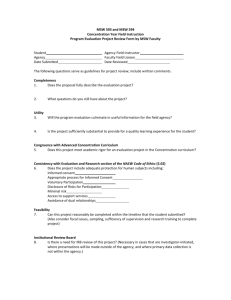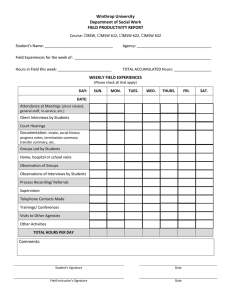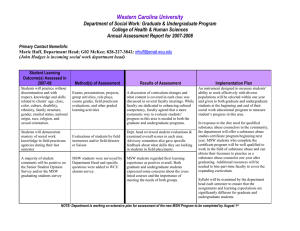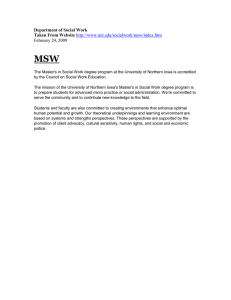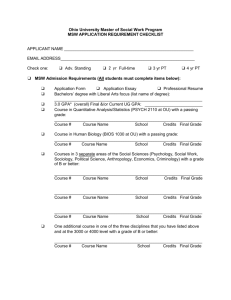Mid-Tennessee Collaborative MSW Program Frequently Asked Questions 1.
advertisement
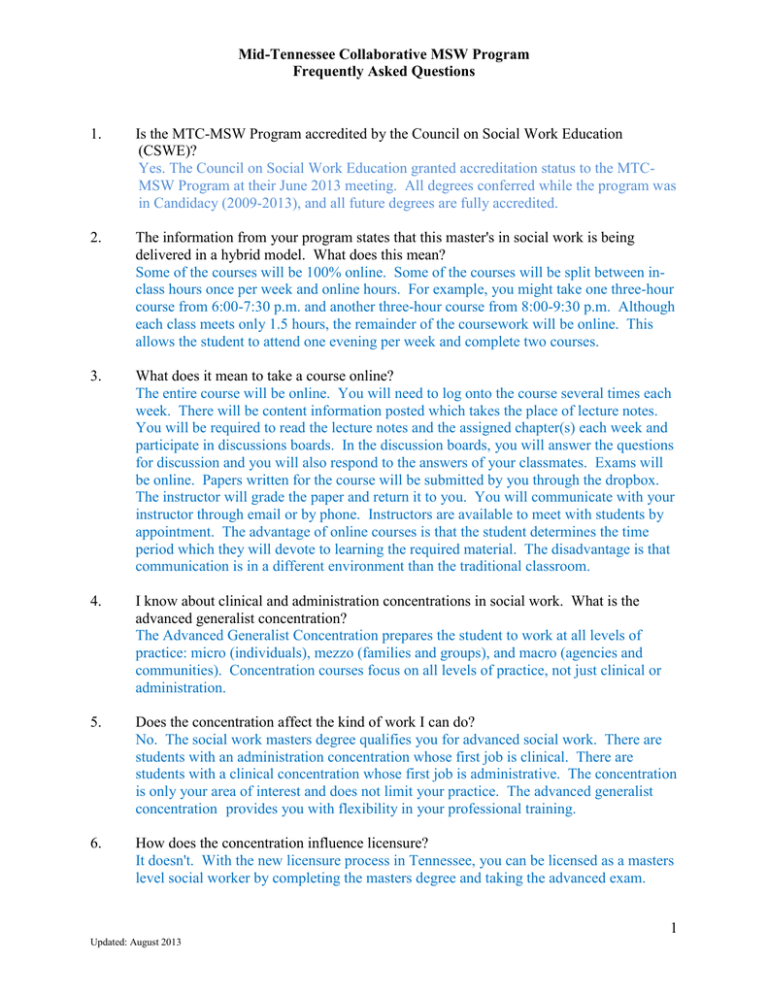
Mid-Tennessee Collaborative MSW Program Frequently Asked Questions 1. Is the MTC-MSW Program accredited by the Council on Social Work Education (CSWE)? Yes. The Council on Social Work Education granted accreditation status to the MTCMSW Program at their June 2013 meeting. All degrees conferred while the program was in Candidacy (2009-2013), and all future degrees are fully accredited. 2. The information from your program states that this master's in social work is being delivered in a hybrid model. What does this mean? Some of the courses will be 100% online. Some of the courses will be split between inclass hours once per week and online hours. For example, you might take one three-hour course from 6:00-7:30 p.m. and another three-hour course from 8:00-9:30 p.m. Although each class meets only 1.5 hours, the remainder of the coursework will be online. This allows the student to attend one evening per week and complete two courses. 3. What does it mean to take a course online? The entire course will be online. You will need to log onto the course several times each week. There will be content information posted which takes the place of lecture notes. You will be required to read the lecture notes and the assigned chapter(s) each week and participate in discussions boards. In the discussion boards, you will answer the questions for discussion and you will also respond to the answers of your classmates. Exams will be online. Papers written for the course will be submitted by you through the dropbox. The instructor will grade the paper and return it to you. You will communicate with your instructor through email or by phone. Instructors are available to meet with students by appointment. The advantage of online courses is that the student determines the time period which they will devote to learning the required material. The disadvantage is that communication is in a different environment than the traditional classroom. 4. I know about clinical and administration concentrations in social work. What is the advanced generalist concentration? The Advanced Generalist Concentration prepares the student to work at all levels of practice: micro (individuals), mezzo (families and groups), and macro (agencies and communities). Concentration courses focus on all levels of practice, not just clinical or administration. 5. Does the concentration affect the kind of work I can do? No. The social work masters degree qualifies you for advanced social work. There are students with an administration concentration whose first job is clinical. There are students with a clinical concentration whose first job is administrative. The concentration is only your area of interest and does not limit your practice. The advanced generalist concentration provides you with flexibility in your professional training. 6. How does the concentration influence licensure? It doesn't. With the new licensure process in Tennessee, you can be licensed as a masters level social worker by completing the masters degree and taking the advanced exam. 1 Updated: August 2013 Mid-Tennessee Collaborative MSW Program Frequently Asked Questions You can be licensed at the clinical level by working in a supervised clinical environment for a specified period and passing the clinical exam. You can be licensed at the administration level by working in a supervised administration environment for a specified period and passing the administration exam. You choose your employment arena and decide which license is best for you and your career. The concentration of your master's in social work does not impact your decision on which license you wish to pursue. 7. When I go back to school, should I apply as a full-time or part-time student? Part-time enrollment is generally recommended for individuals who are working full time while they attend school. Six credit hours per semester is the usual part-time course load. For each 3 credit hours, you will need to schedule your calendar for 3 hours of class time and 3-6 hours of study. So, if you are part-time and taking 6 credit hours, you will need 12-18 hours per week in order to meet the requirements of the courses. The 12-18 hours per week include class time, time for required reading, and time for required assignments such as papers. This is just an average, as some weeks there will be more or less reading, and some weeks will have assignments and some will not. 8. When should I apply for the MSW Program? Applications are available online in October. Applications are due on February 1. Applicants will be notified of admission decisions prior to April 27. 9. Do you accept late applications? Yes, applications are accepted until all positions are filled. Then, a waiting list is maintained. If an applicant that was admitted decides not to attend, we will go to the waiting list to fill that position. 10. What is the process for applying for the Mid-Tennessee Collaborative program? First, you decide which campus you will attend: Austin Peay State University, Middle Tennessee State University, or Tennessee State University. You will apply to the campus where you will be attending the in-person courses. You will register and pay fees at this home campus. Second, you must apply for admission to that university's graduate college. The application is online, has a fee for applying, and requires that your undergraduate transcripts be forwarded. Your GRE score must also be sent to the graduate college. The graduate college is responsible for admitting you only to graduate school, not to a specific program. Third, you must apply for the MSW program. There is an application you will need to print and fill out, along with an essay, and letters of recommendation which are required and should be sent directly to the Social Work Department. Once your application to the MSW program is processed, the MSW program will notify the graduate college of your admission status, and the graduate college will contact you on your final admission status. Both of these application processes must be completed before you can be formally considered for admissions. 2 Updated: August 2013 Mid-Tennessee Collaborative MSW Program Frequently Asked Questions 11. Do I really have to take an entrance exam? If yes, what is the minimum score I have to make? You must take the GRE to be admitted to both the graduate college and the MSW program. The exam is one of the many factors that are considered in reviewing the application. As such, there is no absolute minimum, as your application will be reviewed in its entirety. 12. I heard that there is conditional admission. Is this true? First, all complete applications received by February 1st will be reviewed and a decision will be made on admission. If all of the openings of the program are not filled, the admission committee may review applications for conditional admission. For example, the application is complete except for the GRE score. A student can be given conditional admission based on their submission of the GRE score. However, if all of the openings are filled, no conditional admissions will be made. 13. How important are my letters of recommendation? They are crucial. Your letters of recommendation should be submitted from professionals. Although your pastor or other community leader may be able to address your character and your willingness to work, they do not have a basis of assessing your writing skills or potential employment in social work. 14. Why is there an essay required? Even though you already have a college degree, the program wants an example of your writing. We are looking for essays that are clear and concise. Utilization of professional literature will also enhance your essay. Always proof your essay to ensure that you have used proper grammar and spelling. If you are careless with your essay, the admissions committee will wonder if you are really committed to pursuing higher education. Since the admissions committee does not meet you, it is the essay that reflects you to the committee members. 15. Are there specific undergraduate courses that I should have taken? No. There are no specific prerequisites for admission. However, you should have completed basic liberal arts coursework as an undergraduate. Typically, the courses you took to fulfill the general education requirements for your undergraduate degree provide you with a liberal arts base. 16. I graduated several years ago and my undergrad GPA isn't great. Should I bother applying? Yes. The graduate colleges and social work departments at the three participating universities require an overall GPA of 2.75 for regular admission. However, on rare occasions an individual who has a cumulative GPA below 2.75 will be considered for admission on a conditional basis. 3 Updated: August 2013 Mid-Tennessee Collaborative MSW Program Frequently Asked Questions 17. My undergraduate degree was in engineering. I've worked in that field for a couple of years and realize it's just not what I want to do. I really want to become a social worker. Would you even consider me for the program? Yes, you would be considered for admission. There is not a requirement that your undergraduate degree be in any particular discipline or field, however, you are expected to have completed basic liberal arts coursework. When we review your application we look not just at your GPA and GRE scores, but also at your essay, letters of recommendation, and work and volunteer experiences. Career change is not unusual among MSW students. 18. I heard you offer advanced standing. What would I need to do to be eligible for that? To be eligible for advanced standing you must: have an undergraduate degree in social work from a program accredited by the Council on Social Work Education and have an overall undergraduate GPS of 3.0 or higher. An undergraduate degree in a related field, such as Counseling or Human Services, does not qualify you for advanced standing. 19. I'm not eligible for advanced standing but I have a really strong background in some of this material. What are the exemption exams I've heard about? We don't want students to repeat foundation content that they already know. Therefore, the Mid-Tennessee Collaborative MSW Program offers exemption examinations for three of the first-semester foundation courses: Human Behavior and the Social Environment (SW 6010), Research I (SW 6020), and Social Welfare Policy and Services (SW 6030). If you believe your preparation is particularly strong in one or more of these areas, you can take an exemption examination, which is offered at the beginning of each Fall Semester. You would be exempt for the course if you pass the examination. However, passing an exemption exam does not reduce the number of credits needed for graduation, and you would need to complete additional elective coursework to fulfill these credits. 20. I've taken graduate courses in another field. Can those be counted toward my MSW degree? You may be able to transfer graduate credits if the conditions of the university policy on graduate transfer credits are met and the courses are deemed appropriate for transfer after review by MSW faculty. Coursework used to satisfy the requirements of a prior master's degree will not be eligible for transfer. Transfer credits for coursework taken in another field can be used to fulfill the MSW Program's elective requirements, not the required courses. Internships completed as part of some other, non-social work graduate program will not be considered for transfer credit. 21. OK, but I've taken graduate social work courses at another MSW program. Won't all of those credits be counted? If you have taken graduate-level social work courses at an MSW program accredited by the Council on Social Work Education, the Mid-Tennessee Collaborative MSW Program faculty will evaluate your MSW transcript to determine the equivalency of the courses you've taken with those offered by this MSW program. Transfer credit decisions will be based on the evaluation of your transcript. 4 Updated: August 2013 Mid-Tennessee Collaborative MSW Program Frequently Asked Questions 22. I've 10 years of experience working in the field of social work. Can I get credit for that experience? No. Consistent with the requirements of our accrediting body, the Mid-Tennessee Collaborative MSW Program does not award academic credit for life, volunteer, or employment experience. However, although you will not get academic credit, you have a rich base of experience to draw upon in your classes and this will be of benefit to you as well as the other in your classes. 5 Updated: August 2013
